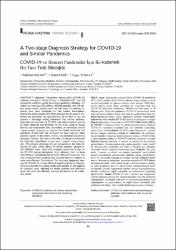| dc.contributor.author | Koçak, Mehmet | |
| dc.contributor.author | Cece, Sinem | |
| dc.contributor.author | Türkay, Tuğçe | |
| dc.date.accessioned | 2023-03-17T11:58:03Z | |
| dc.date.available | 2023-03-17T11:58:03Z | |
| dc.date.issued | 2021 | en_US |
| dc.identifier.citation | Koçak, M., Cece, S. ve Türkay, T. (2021). A two-stage diagnosis strategy for COVID-19 and similar pandemics. Turkiye Klinikleri Journal of Biostatistics, 13(1), 82-90. https://dx.doi.org/10.5336/biostatic.2020-76644 | en_US |
| dc.identifier.issn | 2146-8877 | |
| dc.identifier.uri | https://dx.doi.org/10.5336/biostatic.2020-76644 | |
| dc.identifier.uri | https://hdl.handle.net/20.500.12511/10635 | |
| dc.description.abstract | Objective: Coronavirus disease-2019 (COVID-19) outbreak emerged in Wuhan-China in December-2019, and has covered the world by rapidly becoming a pandemic, infecting >4.5 million by mid-May 2020, killing >300,000 globally, and >90 million people tested. Several rapid test kits based on antibody response have been developed but the reverse transcriptionpolymerase chain reaction (RT-PCR) approach for its superior sensitivity and specificity. As rapid detection of the virus is vital, we propose a two-stage testing framework that utilizes antibodydiagnostic kits and refers to RT-PCR only when a decision cannot be made. Material and Methods: In this study, using the Bayes formula and independent tests assumption, we developed several “repeat-testing” strategies to increase the overall sensitivity and specificity of both tests. We compared the false negatives, false positive, burden on the testing centres, and predicted cost among strategies. Results: We have shown that it is possible to increase the diagnostic capabilities of poor tests, “repeat” testing strategies. The primary advantage of such approaches is the faster diagnosis of cases, which allows for timely isolation, quarantine, and affiliation work. Also such strategies reduce the burden on the RT-PCR testing laboratories, thus, allowing them to focus their efforts to individuals that are more difficult to diagnose. The cost-comparison we conducted also suggests that this proposed is more cost-effective. Conclusion: The two-stage diagnostic strategy for COVID-19 is more efficient regarding pandemic management as it provides the testing results more quickly for the majority of suspected cases, allowing for timely isolation and affiliation work, and more cost-effective, reducing the burden on the healthcare system. | en_US |
| dc.description.abstract | Amaç: Koronavirüs hastalığı-2019 (COVID-19) pandemisi, 2019 Aralık ayında Çin’in Wuhan şehrinde ortaya çıkmış ve hızla yayılım sağlayarak tüm dünyayı etkisini altına almıştır. 2020 Mayıs ayının ortasına kadar dünya genelinde 4,5 milyondan fazla kişi COVID-19 salgınından etkilenmiş, 300.000 kişi vefat etmiş ve 90 milyona yakın kişiye test yapılmıştır. COVID-19 tanısını tespit etmek amacıyla antikor tabanlı birçok hızlı tanı kiti geliştirilmiş fakat ters transkripsiyon-polimeraz zincir reaksiyonu [reverse transcriptionpolymerase chain reaction (RT-PCR)] testinin duyarlılığının ve özgüllüğünün daha fazla olması nedeniyle RT-PCR testleri tercih edilmiştir. COVID-19 vakalarının hızlı bir şekilde tespitinin önemi sebebiyle COVID-19 vakalarının tespitinde hızlı tanı kitlerinin kullanıldığı, sadece karar verilemediğinde RT-PCR testine başvurulan 2 aşamalı bir test stratejisi öneriyoruz. Gereç ve Yöntemler: Bu çalışmada, Bayes formülü ve bağımsız testler varsayımı altında, COVID-19 tanısı için kullanılan antikor ve RT-PCR testlerinin duyarlılık ve özgüllüklerini artırmak amacıyla, 2 aşamalı ve tekrarlı bir test stratejisi geliştirilmiştir. Çalışma kapsamında, yanlış negatifler, yanlış pozitifler, laboratuvarlar üzerindeki test yükü ve önerilen tanı stratejileri arasındaki tahmini maliyetler karşılaştırılmıştır. Bulgular: Bu çalışmada, 2 aşamalı ve tekrarlı test stratejisi önerimizle, zayıf testlerin tanısal yeteneklerinin artırılmasının mümkün olduğu gösterilmiştir. Böyle bir yaklaşımın sağladığı ilk avantaj; alandaki izolasyon, karantina ve filyasyon çalışmalarıdır. Ayrıca bu stratejinin RT-PCR laboratuvarların üzerindeki yükü azaltabileceği ve laboratuvarların çabalarını teşhis konulması daha zor olan bireylere odaklayabileceği gösterilmektedir. Çalışma kapsamında yapılan maliyet karşılaştırmasıyla, önerilen yaklaşımın sağlık sisteminde test maliyetlerini düşürdüğü gösterilmiştir. Sonuç: COVID-19 için 2 aşamalı tanı stratejisinin, şüpheli vakaların çoğunda test sonuçlarının daha hızlı elde edilmesini sağladığından, zamanında izolasyon ve filyasyon çalışmalarına fırsat sağladığından ve uygun maliyeti ile sağlık sistemi üzerindeki yükü azaltacağından dolayı, daha verimli olabileceği sonucuna varılmıştır. | en_US |
| dc.language.iso | eng | en_US |
| dc.publisher | Türkiye Klinikleri | en_US |
| dc.rights | info:eu-repo/semantics/openAccess | en_US |
| dc.rights | Attribution-NonCommercial-NoDerivatives 4.0 International | * |
| dc.rights.uri | https://creativecommons.org/licenses/by-nc-nd/4.0/ | * |
| dc.subject | COVID-19 | en_US |
| dc.subject | Antibody Test | en_US |
| dc.subject | Reverse Transcription- Polymerase Chain Reaction Test | en_US |
| dc.subject | Sensitivity | en_US |
| dc.subject | Specificity | en_US |
| dc.subject | COVID-19 | en_US |
| dc.subject | Antikor Testi | en_US |
| dc.subject | Ters Transkripsiyon- Polimeraz Zincir Reaksiyon Testi | en_US |
| dc.subject | Duyarlılık | en_US |
| dc.subject | Özgüllük | en_US |
| dc.title | A two-stage diagnosis strategy for COVID-19 and similar pandemics | en_US |
| dc.title.alternative | COVID-19 ve benzeri pandemiler için iki-kademeli bir tanı testi stratejisi | en_US |
| dc.type | article | en_US |
| dc.relation.ispartof | Turkiye Klinikleri Journal of Biostatistics | en_US |
| dc.department | İstanbul Medipol Üniversitesi, Rektörlük, Rejeneratif ve Restoratif Tıp Araştırmaları Merkezi (REMER) | en_US |
| dc.department | İstanbul Medipol Üniversitesi, Rektörlük, Sağlık Sistemleri ve Politikaları Araştırma Merkezi | en_US |
| dc.department | İstanbul Medipol Üniversitesi, Rektörlük, Teknoloji Transfer Ofisi | en_US |
| dc.authorid | 0000-0002-3386-1734 | en_US |
| dc.authorid | 0000-0002-5421-4392 | en_US |
| dc.authorid | 0000-0002-2007-4360 | en_US |
| dc.identifier.volume | 13 | en_US |
| dc.identifier.issue | 1 | en_US |
| dc.identifier.startpage | 82 | en_US |
| dc.identifier.endpage | 90 | en_US |
| dc.relation.publicationcategory | Makale - Ulusal Hakemli Dergi - Kurum Öğretim Elemanı | en_US |
| dc.identifier.doi | 10.5336/biostatic.2020-76644 | en_US |
| dc.institutionauthor | Koçak, Mehmet | |
| dc.institutionauthor | Cece, Sinem | |
| dc.institutionauthor | Türkay, Tuğçe | |
| dc.identifier.trdizinid | 491690 | en_US |



















